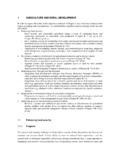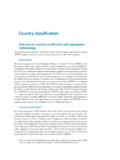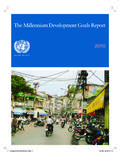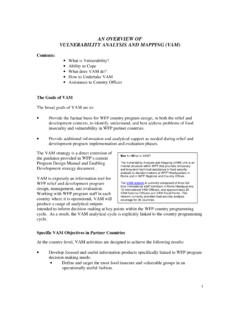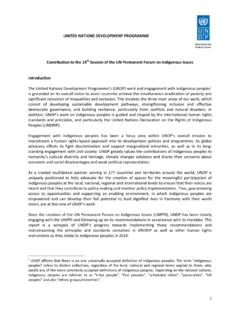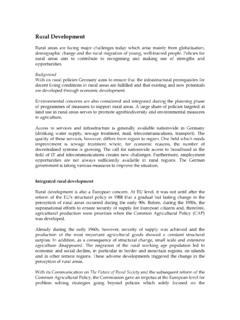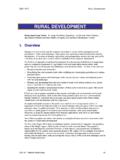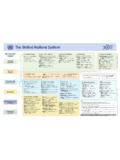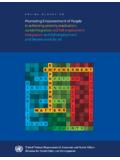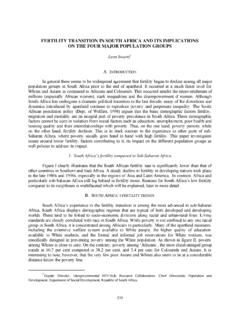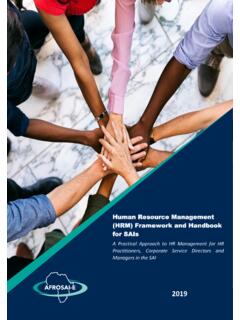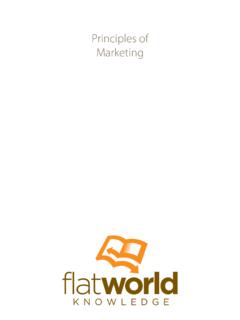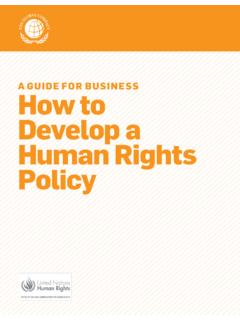Transcription of The Addis Ababa Action Agenda - United Nations
1 1 Financing sustainable development and developing sustainable finance A DESA Briefing Note On The Addis Ababa Action Agenda The Addis Ababa Action Agenda (AAAA) provides: A comprehensive set of policy actions by Member States, with a package of over 100 concrete measures to finance sustainable development, transform the global economy and achieve the Sustainable Development Goals. A new global framework for financing sustainable development that aligns all financing flows and policies with economic, social and environmental priorities and ensures that financing is stable and sustainable. The Action Agenda draws upon all sources of finance, technology and innovation, promotes trade and debt sustainability, harnesses data and addresses systemic issues. It establishes a strong foundation to support implementation of the 2030 Agenda for Sustainable Development. The Action Agenda also serves as a guide for actions by governments, international organizations, the business sector, civil society, and philanthropists.
2 Deliverables announced at the sidelines of the Third International Conference on Financing Sustainable Development in Addis Ababa , along with additional initiatives to be launched, will further contribute to reaching our global goals. Together, they support a revitalized and strengthened global partnership for sustainable development that can end extreme poverty and deliver sustainable development for all. 2 I. A NEW FINANCING FRAMEWORK The financing needs to achieve the 2030 Agenda for Sustainable Development are extremely large, on the order of trillions of dollars annually. Meeting them is not an insurmountable challenge. Global public and private investment would be sufficient but only if financial resources were invested in and aligned with sustainable development. This requires a comprehensive approach, which mobilizes public finance, sets appropriate public policies and regulatory frameworks, unlocks the transformative potential of people and the private sector, and incentivizes changes in consumption, production and investment patterns in support of sustainable development.
3 The AAAA presents a policy framework that realigns financial flows with public goals. Official development assistance (ODA) remains crucial, particularly for countries most in need. But aid alone will not be sufficient. The AAAA addresses all sources of finance: public and private, domestic and international. As in the Monterrey Consensus, it recognizes that finance is not just about financing flows, but also depends on public policies that strengthen the national and international enabling environments. The Agenda reiterates that countries have primary responsibility for their economic and social development, while committing the international community to create an enabling environment for their development. But the AAAA also goes beyond Monterrey to fully take into account the regulatory and other policy requirements for realizing all three dimensions -- economic, social and environmental -- of sustainable development in an integrated manner. Universal in nature, the AAAA is an integral part of the 2030 Agenda for Sustainable Development.
4 Indeed, its full implementation is critical for the implementation of the SDGs. To address the larger and more diverse financing needs associated with sustainable development, the AAAA offers a more nuanced understanding of the benefits and the risks associated with different types of finance. The AAAA puts forward specific public policies and regulatory frameworks to encourage private investments that support the SDGs. It stresses the importance of long-term investment, and the need for all financing to be aligned with sustainable development. It spells out the potential contributions of public finance, highlighting the growing role of national, international and multilateral development banks. It emphasizes that development and dissemination of technology, as well as capacity building, are key means of implementation for the 2030 Agenda for Sustainable Development. And it incorporates each of the means of implementation targets of the Sustainable Development Goals.
5 3 II. Addis Ababa Action INITIATIVES The Addis Ababa Action Agenda includes several new commitments by Governments. These include: A new social compact to provide social protection and essential public services for all Over billion people still lack access to clean water and sanitation, 57 million of the world s children are not enrolled in school, and more than half the world s population lacks any social security coverage. As part of a new social compact, Governments commit to provide fiscally sustainable and nationally appropriate social protection systems, including social protection floors. Governments are also encouraged to set nationally appropriate spending targets for quality investments in essential public services for all, including health, education, energy, water and sanitation. To this end, Governments agree to mobilize additional domestic public resources. At the same time, the international community commits to strong international support for these efforts.
6 A global infrastructure forum to bridge the infrastructure gap Financing needed for basic infrastructure investment in developing countries is estimated to be between $1 trillion and $ trillion annually. To address this financing gap, Member States agree to launch a global infrastructure forum, building on and better coordinating existing infrastructure initiatives. The forum will encourage a wider range of voices to be heard, particularly from developing countries. It will identify and address infrastructure and capacity gaps, with the aim to ensure that no country or sector is left behind, and that the commitment to the social and environmental dimensions of sustainable development is respected. An LDC package to support the poorest countries While official development assistance (ODA) has risen, the share allocated to least developed countries (LDCs) has fallen by 16 per cent last year. As part of the Action Agenda , developed countries commit to reverse this trend.
7 The Action Agenda further encourages them to increase the target for ODA to the world s poorest Nations to per cent of national income, with the European Union promising to do so by 2030. Countries also agree to adopt or strengthen LDC investment promotion regimes, including with financial and technical support. In addition, Governments aim to operationalize the technology bank for the LDCs by 2017. A Technology Facilitation Mechanism to advance to the SDGs The Action Agenda recognizes that the technology divide across a wide range of economic sectors and makes it difficult for developing countries to achieve sustainable development. To help facilitate development, transfer and dissemination of technologies relevant for achieving the SDGs, Member States agree to establish a Technology Facilitation Mechanism, consisting of a United Nations Interagency Task Team, an annual collaborative Multi-stakeholder Forum on Science, Technology and Innovation for the SDGs, and an on-line platform.
8 4 Enhanced international tax cooperation to assist in raising resources domestically Additional tax revenues are required to deliver the new social compact and finance sustainable development. Both improved domestic tax administration and strengthened international tax cooperation are essential to ensure that adequate finance is available. To aid in these efforts, countries agree to strengthen capacity building, including through ODA. They also agree to support existing international initiatives for tax cooperation, with a focus on increased participation of developing countries. In this regard, Member States agree to strengthen the United Nations Committee of Experts on International Cooperation in Tax Matters. Mainstreaming women s empowerment into financing for development While significant progress has been achieved in advancing gender equality in the MDG era, for example in primary school enrollment and access to healthcare for women and girls, more remains to be done.
9 There are significant differences in pay for equal work, women remain underrepresented in government, and violence against women remains unacceptably common. The Action Agenda integrates gender considerations across all of its chapters. It emphasizes the importance of women s and girls human rights and also stresses that women s empowerment can make a significant contribution to economic development for all. It commits countries to undertake legislation and administrative reforms to give women equal rights, and promotes gender-responsive budgeting and tracking among other measures. Additional cross-cutting issues in the Action Agenda include scaling up efforts to end hunger and malnutrition, promoting inclusive and sustainable industrialization, full and productive employment and decent work for all, peaceful and inclusive societies, and protecting our ecosystem. The AAAA draws upon a broad range of financing and technological modalities and combinations of modalities, as well as promising new areas of international cooperation, to promote the delivery of the SDGs and the 2030 Agenda for Sustainable Development.
10 It highlights a set of broad initiatives whose policy content is elaborated in more detail in the ensuing chapters. 5 III. SUMMARY OF THE Addis Ababa Action AGENDA1 The AAAA includes agreements and policy recommendations in seven main chapters: i) domestic public resources; ii) domestic and international private business and finance; iii) international development cooperation; iv) international trade as an engine for development; v) debt sustainability; vi) addressing systemic issues; vii) science, technology, innovation and capacity building; as well as in a concluding section on data, monitoring and follow-up. Domestic public resources For all countries, public policies and the mobilization and effective use of domestic resources are central to the pursuit of sustainable development. Significant additional domestic resources, supplemented by international assistance, will be critical to realizing sustainable development and achieving the SDGs.
